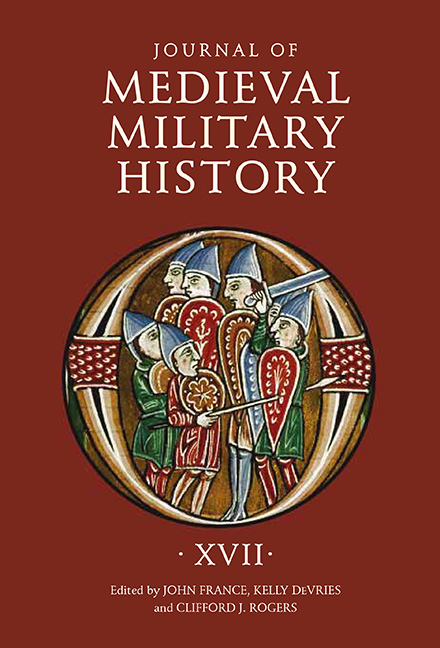Book contents
- Frontmatter
- Contents
- List of Illustrations
- 1 Baktash the Forgotten: The Battle of Tell Bashir (1108) and the Saljuq Civil Wars
- 2 The External Fortifications of ʿAtlit Castle, the Only Unconquered Crusader Stronghold in the Holy Land
- 3 Holy Warriors, Worldly War: Military Religious Orders and Secular Conflict
- 4 Elionor of Sicily: A Mediterranean Queen’s Two Lives of Family, Administration, Diplomacy, and War
- 5 Wives, Mistresses, Lovers, and Daughters: The Fortunes of War for Royal Women in Late Fourteenth Century Castile. OR: A Gender Limitation on Writing History from Chronicles
- 6 The Lance in the Fifteenth Century: How French Cavalry Overcame the English Defensive System in the Latter Part of the Hundred Years War
- 7 Supplying the Army, 1498: The Florentine Campaign in the Pisan Countryside
- 8 Fencing, Martial Sport, and Urban Culture in Early Modern Germany: The Case of Strasbourg
- 9 Note: An Army on the March and in Camp – Guillaume Guiart’s Branche des royaus lingnages
- List of Contributors
- Journal of Medieval Military History 1477–545X
1 - Baktash the Forgotten: The Battle of Tell Bashir (1108) and the Saljuq Civil Wars
Published online by Cambridge University Press: 12 June 2021
- Frontmatter
- Contents
- List of Illustrations
- 1 Baktash the Forgotten: The Battle of Tell Bashir (1108) and the Saljuq Civil Wars
- 2 The External Fortifications of ʿAtlit Castle, the Only Unconquered Crusader Stronghold in the Holy Land
- 3 Holy Warriors, Worldly War: Military Religious Orders and Secular Conflict
- 4 Elionor of Sicily: A Mediterranean Queen’s Two Lives of Family, Administration, Diplomacy, and War
- 5 Wives, Mistresses, Lovers, and Daughters: The Fortunes of War for Royal Women in Late Fourteenth Century Castile. OR: A Gender Limitation on Writing History from Chronicles
- 6 The Lance in the Fifteenth Century: How French Cavalry Overcame the English Defensive System in the Latter Part of the Hundred Years War
- 7 Supplying the Army, 1498: The Florentine Campaign in the Pisan Countryside
- 8 Fencing, Martial Sport, and Urban Culture in Early Modern Germany: The Case of Strasbourg
- 9 Note: An Army on the March and in Camp – Guillaume Guiart’s Branche des royaus lingnages
- List of Contributors
- Journal of Medieval Military History 1477–545X
Summary
Occurring only a decade after the Crusaders first arrived in Syria, the battle of Tell Bashir is unique for battles of the time. Though Muslims and Christians had certainly served alongside each other before, this was the first instance since the crusade where crusaders and Turks allied with each other to fight their co-religionists. Both the surviving sources as well as modern recapitulations vary widely in their retelling of how and why the battle happened. This article seeks to clear up why this confusion exists both in the sources and in our modern literature. Instead of synthesizing the many accounts of the battle, it argues that by following the most robust account provided we end up with the narrative that best coheres with what we know about the characters involved.
In the autumn of 1108, a curious battle unfolded near the castle of Tell Bashir. Not unusual in tactics or strategy, the battle stands out because Christians and Muslims fought on both sides against their co-religionists a mere eleven years after the first crusaders reached Syria. Frankish Count Baldwin II of Edessa allied with Emir Jawuli Saqao of Mosul against the alliance of Tancred, the regent of Antioch, and Prince Ridwan of Aleppo. Though hard pressed, Tancred's coalition routed the forces of Edessa and Mosul. However, saying anything beyond this level of summary is bound to conflict with some other scholar's work. The disagreements are so pronounced that some authors do not even seem to be referencing the same event.
These disagreements are a byproduct of synthesizing diverse sources into a single narrative. While normally reliable, synthesis is the wrong methodology for understanding the battle of Tell Bashir because of the great disparity between many of the sources in terms of thoroughness and reliability. Instead, we should break with normal methodology and try to make a coherent narrative out of the single best source we have: Ibn al-Athir. His work stands out among the extant sources as vastly more detailed and cohesive, but is sidelined because his version frequently conflicts with Latin accounts. In contrast to modern authors who cast the casus belli as local Latin politics, Ibn al-Athir posits that imperial Saljuq politics led to the battle of Tell Bashir. Specifically, that Jawuli Saqao tried to elevate a Saljuq prince to challenge Sultan Muhammad for the Saljuq domains.
- Type
- Chapter
- Information
- Journal of Medieval Military HistoryVolume XVII, pp. 1 - 20Publisher: Boydell & BrewerPrint publication year: 2019



